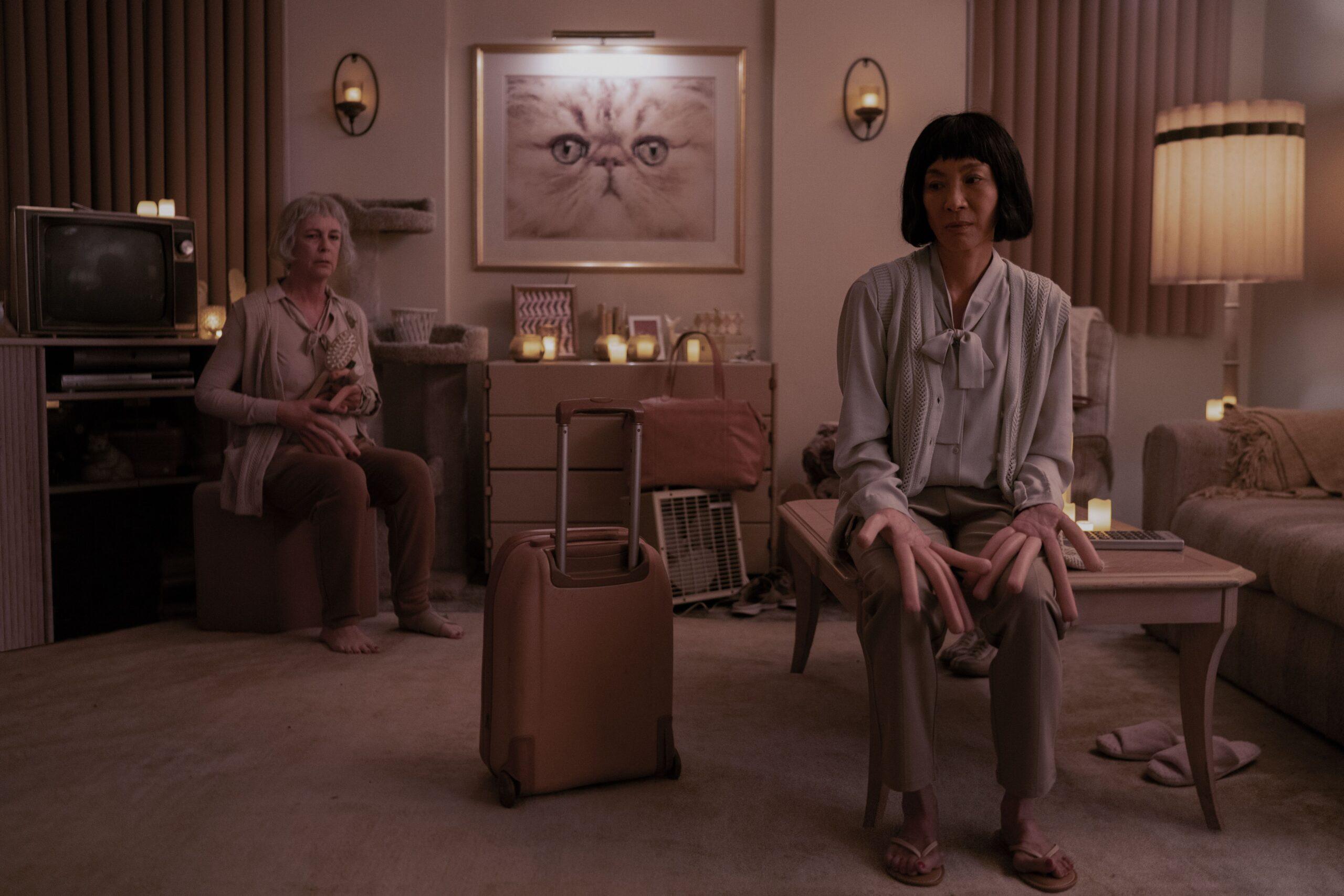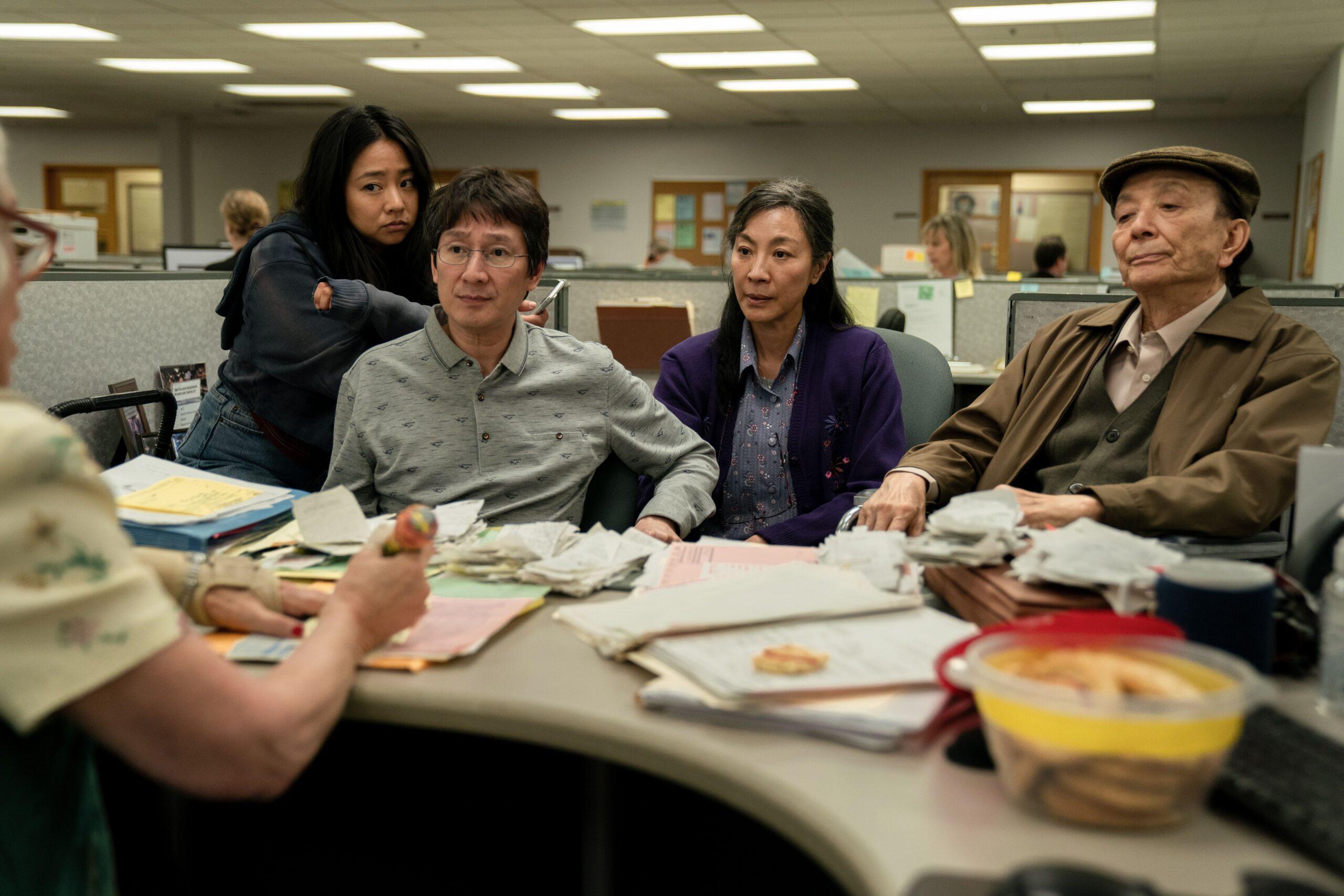From music videos featuring twerking so powerful that it could bust through floors, to movies about a hopeless man finding salvation in a flatulent, sentient corpse portrayed by the guy who played Harry Potter, writer-directors Daniel Kwan and Daniel Scheinert have been pushing the envelope with their bizarre films for years. 2016’s Swiss Army Man, perhaps better known as A24’s “farting corpse movie,” showcased the filmmakers’ wholly unique sensibilities to craft a story with countless WTF moments that mask unexpectedly profound messages. And it was on the press tour for their surreal debut feature that Kwan and Scheinert, who make up the best-named directing duo in the business (Daniels), dreamed up a movie that would be bigger and, somehow, even bolder, as it explored the infinite possibilities of the multiverse.
Six years later, Everything Everywhere All at Once is one of the most imaginative, subversive science-fiction films in recent memory, as well as a singular multiverse narrative in what has lately become a crowded field of them. Daniels’ sophomore feature had the biggest limited-opening weekend of 2022 and is already breaking records for an A24-distributed film ahead of its nationwide expansion on April 8. Michelle Yeoh stars as Evelyn Wang, a middle-aged, Chinese American laundromat owner who is being audited by the IRS while her familial relationships are crumbling around her. It’s an unassuming premise for an unsuspecting protagonist—that is, until Evelyn discovers that her life belongs to just one version of herself in a countless collection of Evelyns across the vast multiverse, as she is thrust into the role of a martial arts hero to save everyone, everywhere. She’s a new Neo, right down to the bullet-stopping powers, but the reality she uncovers spans far more than one world.
Since Kwan and Scheinert started writing Everything Everywhere All at Once in 2016, the multiverse has become a staple of superhero storytelling. Spider-Man: Into the Spider-Verse employed the theoretical concept as a launching pad to nab Best Animated Feature at the Academy Awards in 2019; Avengers: Endgame (2019), Spider-Way: No Way Home (2021), and the upcoming Doctor Strange in the Multiverse of Madness have all used it to help retain Marvel Studios’ global box office dominance; and DC Films is getting in on the multiversal action as it reboots itself after the conclusion of its divisive Snyderverse. (Even 2021’s Shang-Chi and the Legend of the Ten Rings dips its toes into an alternate dimension—and features both Yeoh and Everything Everywhere costar Stephanie Hsu.)
But while the growing volume of multiverse films might have been disheartening for some, Daniels had faith that their mind-bending take on the subject would be unlike anything else audiences had ever seen. “One of the things that comforted us was the fact that we went into it knowing that we were already frustrated with multiverse narratives,” Kwan tells The Ringer. “This was back in 2016 when we started writing it. And the frustrating thing about them is that no one is willing to go to the logical conclusion, which is infinity. If every single choice branches off into another universe, there should be an infinite number of universes, which means narrative doesn’t matter; choices don’t matter. Why should you care at all?”
The vast majority of superhero movies that tackle the multiverse hardly ever linger too long on this existential idea—and perhaps that’s to be expected when a hulking green human and a talking raccoon can walk into a room and find a god casually drinking beer with a gaming rock warrior. More often than not, these blockbuster superhero vehicles use the multiverse as a means of narrative rule-bending to allow characters to return from the dead, or say, bring three Spider-Men together for a crowd-pleasing, interdimensional reunion worth almost $2 billion worldwide.
Everything Everywhere stops to question the roots of the concept itself, without shying away from the nihilistic response that one would have in the wake of such a mind-breaking discovery. “When you watch a lot of these multiverse movies, it’s just like, ‘Does any of it matter?’ It waters down every decision,” Kwan says. “It’s like when you play Choose Your Own Adventure: By the end, you’ve seen so many endings that you just don’t care anymore. Nothing actually sticks. And so the whole premise [of Everything Everywhere] started with the idea that we would play with that, push it all the way to its logical conclusion, and then try to pull the audience out of it. We felt pretty confident no one else was going to try that, because it’s a bad idea. It’s a really hard thing to do.”
While Daniels were working on Everything Everywhere, they were approached to direct Loki, yet another universe-jumping adventure for Marvel Studios—and the duo passed on it. Marvel is a blockbuster titan that routinely spends hundreds of millions on its films, but Daniels gambled on the strength of their vision and maximized a budget of $25 million into a wilder theatrical journey than the rest of the competition. Everything Everywhere is weird, confusing, hilarious, shocking, and profound all at once, as any story that revolves around an infinite number of universes and possibilities should be.
As Evelyn Wang is tasked with stopping a looming threat that could jeopardize the existence of, well, everything, she starts to see and experience all the paths her disappointing life could have taken her had she made different choices along the way—including the decision to leave her home to run away with her sweet, meek husband Waymond (Ke Huy Quan) and open a laundromat business in America. With a little help from a version of her husband with a stronger will and sensibilities closer to those of an action star (who is conveniently dubbed Alpha Waymond), Evelyn’s multiversal adventure introduces her to worlds where she’s a martial arts movie star, a hibachi chef, and a Chinese opera singer, as well as one where human beings evolved with floppy, hot-dog fingers.

Each absurd idea afforded Daniels the opportunity to have some creative fun by hopping among genres and styles that could bring each universe to life, ranging from aping the filmography of Wong Kar-wai to spoofing Ratatouille. “We had ideas of what genre each universe might dip into, and a lot of our department heads also weighed in,” Scheinert says of the film’s creative process. “So we worked with our cinematographer Larkin [Seiple] about genres that he was excited to play in, and sometimes it went in directions we didn’t expect. Ratatouille is a [computer-generated] film, so there was no aesthetic guide necessarily. And then we got to create a very weird, live-action, alternate version of what genre that’s going to be.”
Kwan adds, “We were excited to just take every genre and see if we can thread them through this movie. We used to say that we imagined it being a family drama that gets interrupted by a sci-fi action movie that then gets sidetracked by a romance that then encloses into the internet, YouTube videos. It becomes this movie that eats itself and destroys itself so that it can find something more honest.”
Everything Everywhere features fight sequences in which Evelyn duels henchmen who are wearing (?) makeshift butt plugs, juxtaposed with romantic scenes involving Evelyn and her auditor (played by Jamie Lee Curtis) in the Hot-Dog Hands Verse. But it’s also a family drama that is more affecting than it has any right to be. That speaks to the strength of Daniels’ filmmaking prowess, as well as an admirably committed cast led by Yeoh in what is somehow her first Hollywood top billing after more than 20 years in American cinema. Yeoh is joined by a rising star in Stephanie Hsu (The Marvelous Mrs. Maisel) as Evelyn’s daughter, Joy; the legendary James Hong (who is just as sharp at age 93) as Evelyn’s visiting father; and a resurgent Ke Huy Quan, who first stole audiences’ hearts in the ’80s as a child actor with roles in Indiana Jones and the Temple of Doom and The Goonies.
In another universe, Everything Everywhere would have relegated Yeoh to a supporting role with Jackie Chan cast as the film’s star instead. “At the very beginning we were writing a movie and we imagined Michelle Yeoh and Jackie Chan,” Scheinert says. “After we wrote a draft and found out how much he costs, we started thinking, ‘Who else do we like out there?’ And we couldn’t come up with anyone we liked more than Michelle. Once we started kicking around the idea of just centering her character, the script became so much more interesting, because we have very strong-willed moms and we haven’t seen an action movie starring our moms. It was almost like we started writing something that we had seen before and then it became something we hadn’t seen before, and that was so exciting.”
A Chan-Yeoh reunion, 30 years after the release of Supercop (and, a little less notably, 11 years after they both provided voicework for Kung Fu Panda 2), would have been an entertaining spectacle in itself, but Yeoh’s star turn is the transcendent, unifying force that allows Daniels’ wacky genre play to work so effectively. She gracefully guides an increasingly disarmed audience through Everything Everywhere’s mayhem as a protagonist who’s just as flummoxed when the story starts. The film immerses itself in heady concepts in outlandish, faraway realities and showcases incredible fight choreography with help from the Martial Club, while never losing sight of Evelyn’s emotional journey as her marriage with Waymond fails and she projects a life of regrets and generational trauma onto her daughter. The character-driven core sets the film apart from more somber and dispassionate explorations of multiverse-induced anomie.
“I have a low tolerance for science fiction that is just world-building for the sake of world-building,” says Scheinert. “And so, right at the beginning, it was, ‘How does the multiverse make us feel and what could it represent that is a useful contribution to the conversation we’re having about life in the 21st century?’ We landed on this family and it was always the North Star, the priority. We had so many crazy ideas that didn’t help that story, and that was how we decided what to keep—what makes Evelyn confused or would make her emotional, or has a connection to what it’s like to be our parents’ age and have kids that were raised on the internet.”

Everything Everywhere does its best to live up to its title and could be categorized as any number of genres, but above all else, it’s a family drama perfectly suited for our uncertain times. Daniels began writing the screenplay when Donald Trump’s campaign was just starting to succeed, and the events of subsequent years—including the chaos of Trump’s presidential term, a global pandemic, a growing climate crisis, and most recently, Russia’s invasion of Ukraine—have only cemented the sense of unpredictable pandemonium. The directing duo doesn’t have an answer to the world’s multitude of problems, and their latest film isn’t some grandiose attempt to solve them. But with the multiverse as its chief weapon of both destruction and reconciliation, Everything Everywhere sets out to remind its audience of the power of empathy in an attempt to connect with anyone who’s trying to make sense of a world where we’re often left helplessly doomscrolling.
“Every movie is trying to create something universal out of the very specific,” Kwan says. “It’s the biggest things with the smallest things, combining those things. We haven’t found those stories that can really balance them out in our modern version of that, because the universal has to not only encapsulate the globalization that’s happened, but it’s also post-globalization, and the internet has created its own world that we also have to incorporate into it—and that’s a world that keeps growing.
“We wanted to create a movie that could capture that feeling of the growing chaos and the growing sense of these runaway worlds that we will never be able to connect with,” Kwan continues. “And to put a family in the middle of all that—that can have relationships that are strong enough that they don’t get washed away by all of that—was really important. Because if we could prove that, then maybe we could prove that we won’t get washed away too.”
